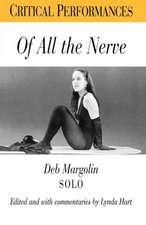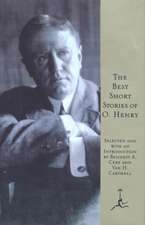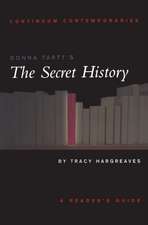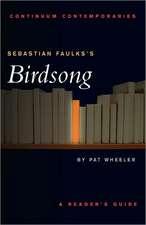Late Book Culture in Argentina
Autor Dr. Craig Epplinen Limba Engleză Hardback – 22 oct 2014
| Toate formatele și edițiile | Preț | Express |
|---|---|---|
| Paperback (1) | 254.84 lei 6-8 săpt. | +89.09 lei 5-11 zile |
| Bloomsbury Publishing – 24 feb 2016 | 254.84 lei 6-8 săpt. | +89.09 lei 5-11 zile |
| Hardback (1) | 712.90 lei 6-8 săpt. | |
| Bloomsbury Publishing – 22 oct 2014 | 712.90 lei 6-8 săpt. |
Preț: 712.90 lei
Preț vechi: 1026.72 lei
-31% Nou
Puncte Express: 1069
Preț estimativ în valută:
136.43€ • 141.91$ • 112.63£
136.43€ • 141.91$ • 112.63£
Carte tipărită la comandă
Livrare economică 14-28 aprilie
Preluare comenzi: 021 569.72.76
Specificații
ISBN-13: 9781623562700
ISBN-10: 1623562708
Pagini: 168
Ilustrații: 9 halftone illus
Dimensiuni: 152 x 229 x 18 mm
Greutate: 0.39 kg
Ediția:New.
Editura: Bloomsbury Publishing
Colecția Bloomsbury Academic
Locul publicării:New York, United States
ISBN-10: 1623562708
Pagini: 168
Ilustrații: 9 halftone illus
Dimensiuni: 152 x 229 x 18 mm
Greutate: 0.39 kg
Ediția:New.
Editura: Bloomsbury Publishing
Colecția Bloomsbury Academic
Locul publicării:New York, United States
Caracteristici
Explores the effects on publishing of late capitalism and the global economic crisis through a case study of publishing in Argentina
Notă biografică
Craig Epplin is Assistant Professor of Spanish at Portland State University, USA. He has published articles on Latin American literature, film, and media culture.
Cuprins
Acknowledgments Introduction Genealogy Chapter 1: First Publish, Then Write Chapter 2: Flight Forward Chapter 3: Cardboard and Cumbia Morphology Chapter 4: The Book as Performance Chapter 5: The Book as Manuscript Chapter 6: The Book as Database Epilogue Notes Bibliography
Recenzii
From the very first pages, Epplin fights against the tendency to view literary production as coterminous with the book. He has accumulated a set of stimulating and compelling examples of literature, of which have in common the problematization or the outright rejection of the book-object as the neutral form in which literary content is disseminated. ... Epplin's study presents a deep, engaged interpretation of one particular local manifestation of late book culture ... Epplin's monograph will be of interest to students and scholars of contemporary Argentine literature, and it will surely provide an important reference point for future comparative studies of global book culture and media-specific analysis.
Epplin's ... focused study analyz[es] the ways in which 'the book' has experienced transformations as both subject and object in contemporary Argentina and Cala Buendia's examining cultural 'products' in Bogota, Peru, and Argentina and the strategies by which these acts of cultural production contributed to social change. Epplin does an admirable job balancing textual and extra textual analysis, considering, one might say, the book from the outside and the inside. ... Epplin shows the vibrant intermingling of text, book, and digital media in contemporary Argentina.
[T]his is a very interesting, well-researched, timely book. It is a valuable contribution for Hispanists as well as for those interested in cultural theory and the changing trends of literary practice.
"Craig Epplin has written a great little book about other little books. . Epplin repeats that his little book about other little books is not to be interpreted as a snapshot of the canary in the coal mine of the possibility of serious mainstream Argentine literature. But he argues that these little books are more significant. And he does leave open the question of to what extent this new literary landscape should change the way we should read and interpret the books themselves-especially if the ones that matter are merely the residue of the experience of writing. ... I am also excited to try to expand his ideas and paradigms to authors he did not make room for-Fresán, Chitarroni, Pauls, Kohan, Cabezón Cámara-, and to other spaces that seem relevant to late book culture ... Late Book Culture in Argentina can help reshape many of the debates about Argentine, and possibly all Latin American, literature in the twenty-first century.
Epplin's work, at least in theoretical terms, is the most ambitious of the volumes under consideration. Its title, Late Book Culture in Argentina, reveals immediately the intention to comment on writing and publishing in a way that transcends national boundaries, even if his corpus stays within them.. Epplin's is a far-reaching and smart book, and he maintains comparisons and connections that may not seem at first obvious to many readers.
Craig Epplin's Late Book Culture in Argentina is a superbly engaging, precisely written analysis of Argentine culture's grappling with the inevitable changes brought about by the advent of digital technologies. The expected account of digital platforms is put aside, and the reader is instead surprised by Epplin's masterful and novel perception of Osvaldo Lamborghini's obsession with the hand-made, artisanal as ready-made, as the degree zero of the paradigm shift in book culture. That is, Epplin does not go and give us the lineage of the rise of digital works in Argentina per se, but of the return (because Macedonio Fernadez emerges as the forerunner) of an 'uncreative' kernel that has re-emerged with renewed strength in the last couple decades and that is at the heart of what many media theorists have termed 'remixing'. The last chapter on Katchadjian is a real tour de force. Epplin's book opens a new chapter in the historiography of Argentine literature. Late Book Culture will soon be a must read.
Epplin provides a timely and thoroughly-researched critical ethnography of avant-garde literary practices in Argentina. Late Book Culture in Argentina will be of interest to specialists and general readers alike.
Late Book Culture in Argentina offers the reader an impeccable balance between close reading, cultural theory, and socio-historical contextualization. Scholars working on contemporary Argentina and academics interested in material culture or book history will find in this study illuminating discussions of some of the major theoretical debates in these fields.
This book is a subtle exploration of the limits of the literary practice. Epplin reflects on the intersections of literature, aesthetics, material production, and distribution of books, where he finds the possibilities for contemporary experimentation. In a brilliant counterpoint, his arguments highlight local works in a global media context.
Epplin's ... focused study analyz[es] the ways in which 'the book' has experienced transformations as both subject and object in contemporary Argentina and Cala Buendia's examining cultural 'products' in Bogota, Peru, and Argentina and the strategies by which these acts of cultural production contributed to social change. Epplin does an admirable job balancing textual and extra textual analysis, considering, one might say, the book from the outside and the inside. ... Epplin shows the vibrant intermingling of text, book, and digital media in contemporary Argentina.
[T]his is a very interesting, well-researched, timely book. It is a valuable contribution for Hispanists as well as for those interested in cultural theory and the changing trends of literary practice.
"Craig Epplin has written a great little book about other little books. . Epplin repeats that his little book about other little books is not to be interpreted as a snapshot of the canary in the coal mine of the possibility of serious mainstream Argentine literature. But he argues that these little books are more significant. And he does leave open the question of to what extent this new literary landscape should change the way we should read and interpret the books themselves-especially if the ones that matter are merely the residue of the experience of writing. ... I am also excited to try to expand his ideas and paradigms to authors he did not make room for-Fresán, Chitarroni, Pauls, Kohan, Cabezón Cámara-, and to other spaces that seem relevant to late book culture ... Late Book Culture in Argentina can help reshape many of the debates about Argentine, and possibly all Latin American, literature in the twenty-first century.
Epplin's work, at least in theoretical terms, is the most ambitious of the volumes under consideration. Its title, Late Book Culture in Argentina, reveals immediately the intention to comment on writing and publishing in a way that transcends national boundaries, even if his corpus stays within them.. Epplin's is a far-reaching and smart book, and he maintains comparisons and connections that may not seem at first obvious to many readers.
Craig Epplin's Late Book Culture in Argentina is a superbly engaging, precisely written analysis of Argentine culture's grappling with the inevitable changes brought about by the advent of digital technologies. The expected account of digital platforms is put aside, and the reader is instead surprised by Epplin's masterful and novel perception of Osvaldo Lamborghini's obsession with the hand-made, artisanal as ready-made, as the degree zero of the paradigm shift in book culture. That is, Epplin does not go and give us the lineage of the rise of digital works in Argentina per se, but of the return (because Macedonio Fernadez emerges as the forerunner) of an 'uncreative' kernel that has re-emerged with renewed strength in the last couple decades and that is at the heart of what many media theorists have termed 'remixing'. The last chapter on Katchadjian is a real tour de force. Epplin's book opens a new chapter in the historiography of Argentine literature. Late Book Culture will soon be a must read.
Epplin provides a timely and thoroughly-researched critical ethnography of avant-garde literary practices in Argentina. Late Book Culture in Argentina will be of interest to specialists and general readers alike.
Late Book Culture in Argentina offers the reader an impeccable balance between close reading, cultural theory, and socio-historical contextualization. Scholars working on contemporary Argentina and academics interested in material culture or book history will find in this study illuminating discussions of some of the major theoretical debates in these fields.
This book is a subtle exploration of the limits of the literary practice. Epplin reflects on the intersections of literature, aesthetics, material production, and distribution of books, where he finds the possibilities for contemporary experimentation. In a brilliant counterpoint, his arguments highlight local works in a global media context.


















